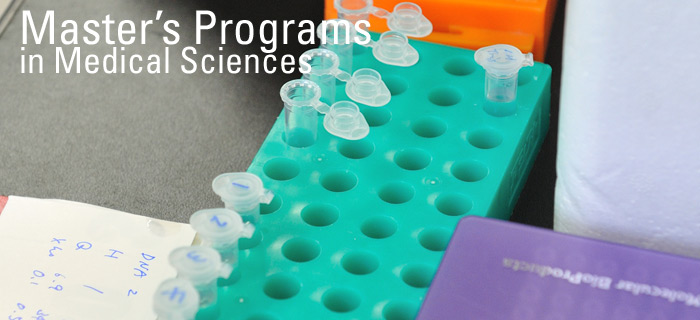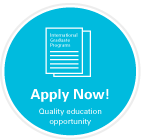Programs

Introduction
Medical sciences and medical care, with their related fields of science and technology, have made remarkable progress lately. The related areas founding the basis of medicine are rapidly growing, expanding and diverging. Thus, integration of medicine-related sciences and technologies is strongly desireable. It now is an important social need to cultivate professionals who are well educated in the medicine-oriented sciences.
The Master's degree program in medical sciences was established to provide opportunities for those students who had received undergraduate education than other medicine to obtain knowledge of medicine and medical sciences, and to develop the ability of its application. Graduates of this program are expected to contribute to the progress of research in the fields of basic medical sciences, clinical medicine and community medicine. It is also the aim of this program to train professionals who can serve as experts in various medicine-related fields, such as preventive medicine, occupational medicine, medical welfare, medical engineering and medical administration, and other related fields.
Global 30 Master of Public Health Program: There is a growing need for highly-trained public health professionals skilled in preventing illness and protecting health in the local, national, and international communities. This program is designed for professionals in various medicine-related fields who intend to incorporate public health skills into their current work and to change their careers. We aimed to equip the students with competence to become tomorrow's public health leaders, educators and researchers, namely, a new generation of public health professionals who help people to achieve healthier life around the world. Students can select either one of two programs, Accelerated Master of Public Health Program or Master of Public Health Program, according to their prior professional experiences, academic backgrounds, and future plans. Accelerated Master of Public Health Program: The curricula with 30 credits are designed to develop abilities of key public health skills and to finish in one year. This program includes core coursework of public health such as Biostatics, Epidemiology, Environmental Health, Public Health Management and Policy, Public Health Practice, and Social and Behavioral Sciences and aims to produce ethically, culturally, and scientifically competent, topnotch public health practitioners. Instead of a master's thesis, each student must conduct a special project, Advanced Exercise on Public Health, in the last term which covers overall cross-disciplinary fields of public health. The Advanced Exercise on Public Health offers the student the opportunity to synthesize both theoretical and practical coursework. Its outcome is assessed by a written report and a final oral presentation near the end of the program. Master of Public Health Program: This is a two-year, 30-credit program. The first year mainly involves core coursework of public health such as Biostatics, Epidemiology, Environmental Health, Public Health Management and Policy, Public Health Practice, and Social and Behavioral Sciences, while the second year is devoted to research on public health. Students who wish to learn more about the methods and research of public health and pursue a PhD are encouraged to select this program. All students must prepare a master's thesis and make an oral presentation to show their competence in research activities.
Masters Program in Medical Sciences: This program is designed for student to enroll in the existing Master’s programs offered in Japanese at the University of Tsukuba, Medical Branch. Students in this program may also elect to take courses taught in English toward their degree. Japanese applicant living abroad may apply to this program.
Dual Master’s Degree Program: The program gives students of the Master's Program in Medical Sciences, University of Tsukuba, and National University of Ho Chi Minh City and Ho Chi Minh City University of Medicine and Pharmacy an opportunity to study in the master's program reciprocally, and the students are able to acquire degrees from both universities (dual degree) through academic studies and research activities in each institution. The learning period will be two years for students from Vietnam and a year for Japanese students. Students from Vietnam are expected to earn 10 credits out of 30 required credits in Vietnam, and with the remaining 20 credits earned in Japan, including a master's thesis, which will fulfill the requirement for the degree (Medical Sciences). The students of the University of Tsukuba will acquire a master's degree either in Science or in Pharmacy in Vietnam. The curriculum instructed in English in the Master's Program in Medical Sciences, University of Tsukuba, is organized with a variety of courses which extend to clinical, basic and community medicine in the comprehensive fields of medical sciences. Thus students are able to select courses of their interest and future goals. Through basic research of life sciences and research leading to medical care, students of both countries are expected to devote themselves toward the betterment of society. With an international mind, they will practice as medical professionals such as researchers, educators or highly skilled specialists.
Curriculum
In order to meet the changing and growing demands of medical sciences, public health, health care and welfare, the curriculum has been structured to accommodate the diversity of student backgrounds. The requirements for students admitted to any of the above program are generally the same. The curriculum is comprised of (1) fundamental subjects, including human anatomy, physiology, biochemistry, overview of clinical medicine, overview of social medicine and English in medical science, (2) electives and advanced subjects including all of the basic medical science disciplines, biotechnology, pathology, clinical medicines, sports and health, social medicine, medical welfare, medical information technology, experimental animal sciences, and (3) thesis for the Master’s degree. Total required credit units for graduation are 30 units, most of which have to be finished in the first year. The thesis work should be carried out under the direction of an advisor.
Faculty
A more than 180 member full time faculty represent major biomedical and social medical discipline. More than 60 academic research groups offer graduate training to prepare the candidates for professional positions in medical sciences and other related fields.
Resaerch Groups
